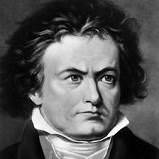Leave It To Ludwig
Presented in collaboration with The Chicago Chamber Musicians
In the Chicago Shakespeare’s Courtyard Theater, Navy Pier
Saturday January 19 and Sunday January 20, 2013 at 10 a.m. and 11:30 a.m.
Tickets $20 adults, $15 for children
“The Greatest Composer in the World”
I must confess that as young child I always had a particular dislike for “children concerts,” usually an over-simplified mish-mash with more cheesy show-and-tell than real performance, and none of the majesty, dignity, and excitement that even the youngest child will find in the concert hall. How much more delightful, then, was it to see this brilliantly conceived one-hour introduction to Beethoven, by Bruce Adophe, pianist, composer and long time collaborator with the Chamber Music Society of Lincoln Center in New York, where he directs the well-known family concert series “Meet the Music”. And the fact remains that the content of this one hour concert/theatre piece, in which Beethoven comes to life to reveal to a young amateur pianist the true heart and soul of his music, is extremely entertaining and indeed edifying to people of all ages. It is also a good opportunity to here live String Quartet Music by the all time master of the genre: Audiences members are obliged with movement selections from The Quartetto Serioso, Opus 131, and Opus 135, among others, played by a quartet of four ensemble members from The Chicago Chamber Musicians, Joseph Genualdi, Mathias Tacke, Chenga-Hou Lee and Remi Solomonow, who are collaborating with Chicago Shakespeare Theater in presenting four performances this weekend at the Navy Pier.

The conceit is that a young pianist (James F.Giles) is having trouble realizing an early Beethoven Piano Sonata in C minor, when a bust of the composer which he had ordered arrives. Placed on a table beside the piano, the bust magically becomes a real-life, and, if I may say so, utterly convincing, Ludwig Van Beethoven (Bruce Adolphe), who, on hearing the pianist, bursts into a rhapsodic remonstration on how to realize his music with all it proper depth and subtlety. It might help, Beethoven reasons, if the young pianist might hear a little more of his music. And what better genre to showcase the wide-ranging genius of Beethoven than the String Quartet, spanning his entire career, from the gems of is early style that are the Opus 18 quartets, to the late Quartets,131, 132, 135 etc some of the last things he ever wrote. It also happens that a quartet of musicians fit quite nicely on the Chicago Shakespeare Theater Stage.
Much of the success of Leave It to Ludwig stems from the highly eccentric and altogether believable figure that Adolphe cuts as Beethoven. He has just the sort high-minded, and yet thoroughly amiable charisma likely possessed by the composer himself. After Beethoven claims towards the beginning of the piece that he can create a true musical composition, tell a musical story, if you will, out of any melody you can think of, The Young Pianist gives him the tune to “Three Blind Mice” to try out. After first ridiculing such an boring, and simplistic choice as a little ditty to a nursery rhyme, Adolphe sits down the piano, and proceeds to embark on a highly-Beethovenian, passionate development of “Three Blind Mice”, with variously overlaid, ever-thickening textures, moving into all sorts of foreign keys. Beethoven has truly come alive.
Idealistic, and with very little tolerance for small-mindedness and duplicity, Adolphe’s Beethoven is also perhaps the least pretentious man one could ever hope to meet with. He is anything but the stuffy, detached sort of figure one tends to associate with classical music. Adolphe tells a number of very good stories, most of which I had not heard, about personal incidents surrounding the composition of some of Beethoven’s works, and makes a very good argument that Beethoven’s main innovation was to bring music the point of being a true representation of both inner and outer life, rather than simply dances, and adagios expertly sewn together. What, indeed, makes Beethoven’s style supreme, is precisely the way in which he brought together the well-formedness, elegance, and plain good taste of the late classical period, with a sense of Romantic pathos, and zealous creativity seldom ever heard. He is, as Adolphe will have the whole audience shouting by the plays’ end, “The Greatest Composer in the World”. Certainly not a bad value for kids to grow up having.
Recommended
Gabriel Kalcheim
Date Reviewed: January 19, 2013

